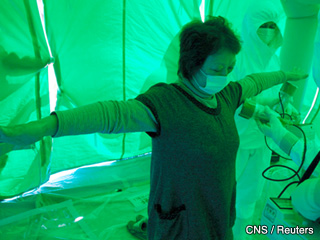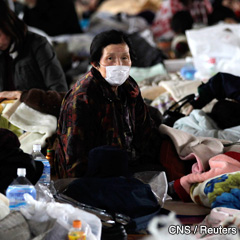“It’s not just a political decision, or a scientific decision, or an economic decision, or even an environmental decision,” he told The Catholic Register. “It’s got to be all of those factors.”
For Christians a decision as complex as this has to involve prayer, reflection and an examination of our collective conscience.
“We are that creature that has self-reflective consciousness. We’ve been given a certain intelligence by God, and we’re expected to use it,” O’Hara said.
People on all sides of the nuclear debate agree with O’Hara — nukes or no nukes is a moral question.
Mike Belmore, external relations officer for The Society of Energy Professionals, believes “there’s a huge role for faith communities” in deciding our energy future.
“It’s about stewardship,” he said.
“This is a power source that has lots of ethical and moral considerations,” said Greenpeace nuclear analyst Shawn-Patrick Stensil. “We need to have a conversation about responsibility. When we produce this technology, it’s others who are taking the risk.”
“It’s ethical in the sense that the now, the present, is poisoning the future,” said environmentalist, mathematician and physicist Anna Tilman.
Tilman is the author of a submission to the Darlington New Build Joint Review Panel on behalf of the International Institute of Concern for Public Health, a think tank established by Sr. Rosalie Bertell, a Grey Nun of the Sacred Heart. Tilman’s 25-page submission sticks carefully to the language and methods of science, using her background teaching math to engineering students at the University of Toronto and her own graduate research in medical biophysics. People who want to use the language of morality, let alone the insights of theology, aren’t taken seriously by nuclear regulators, she said.
“There’s an element of rudeness, if you address any of these issues, from the tribunal,” she said. “Tribunal experiences are quite daunting.”
 If religious voices are treated with suspicion, that’s no reason for Catholics to retreat, said Jesuit Father Roger Yaworski. As a spiritual director at Loyola House in Guelph, Ont., Yaworski specializes in teaching people how to make good decisions in their personal lives. But the principles of spiritual discernment he teaches are applicable to collective decisions in a secular context. The goal is to make a decision that isn’t biased by our most immediate appetites and desires.
If religious voices are treated with suspicion, that’s no reason for Catholics to retreat, said Jesuit Father Roger Yaworski. As a spiritual director at Loyola House in Guelph, Ont., Yaworski specializes in teaching people how to make good decisions in their personal lives. But the principles of spiritual discernment he teaches are applicable to collective decisions in a secular context. The goal is to make a decision that isn’t biased by our most immediate appetites and desires.“We want freedom when we go to make decisions,” Yaworski said. “When we put out the options, we can’t be swayed by sinful inclinations, to put it grossly.”
If decisions on nuclear power are driven by a form of greed that demands cheap electricity so nothing in our lives has to change, that may not be a free decision, he said.
“If we need electricity, do we get it at all costs?”
Looking at it from the point of view of the engineers, Belmore is adamant that conservation alone isn’t the answer.
“We’re not going to conserve our way out of nuclear or dirty coal and gas any time soon,” he said.
The real choice society faces isn’t between nuclear and the softer alternatives like wind, solar and conservation, said Belmore. The real choice is between nuclear and fossil fuels that contribute to global warming.
But the scientific facts about that choice can be hard to get at, said O’Hara.
“Let’s say we got rid of all the coal-fired electric generation plants in the world, and you replace them with nuclear energy by 2050. You’re only going to reduce greenhouse gases by about five per cent,” he said.
Despite studying the question since he was in high school 30 years ago, O’Hara still has no fixed and final position on nuclear energy.
“The hardest thing I find around nuclear power is to filter through the lobbying from all sides. It’s hard to get to the science.”
With people running around buying up iodine pills to protect them from radiation, based on what they see in Japan, Belmore worries about collective panic and Twitter-fueled rumour making up people’s minds.
“Moral questions are all hard,” he said. “People need to get as much information as they can before they meditate on it, pray on it.”
There’s a difference between panic and legitimate fear, said Tilman.
“I don’t think panic is the solution,” she said. “But if people are going to be conscious of this, maybe they can rethink this path we are living if it’s not sustainable.”
“It has to be a properly informed discernment where we look at the best information possible, reflect on that, pray on that,” said O’Hara. “It’s going to be a hybrid solution, no matter what we have. The question is whether nuclear is part of that hybrid solution.”
Looking for Church guidance on nuclear power can be tough. Neither the Canadian Conference of Catholic Bishops nor the Assembly of Catholic Bishops of Ontario could find anything in their archives regarding nuclear power. While the Vatican has spoken frequently on nuclear warfare since Pope John XXIII’s 1963 encyclical Pacem in Terris, there are no teaching documents that address nuclear power.
In 2007 Cardinal Renato Martino told a journalist that he saw no reason to rule out peaceful uses of nuclear technology, and criticized Italy for barring nuclear plants from its soil in 1987 but importing electricity generated by nuclear plants in France.
Among the most immoral arguments in the debate come from wind power opponents who contribute junk science on supposed health effects of turbines and battle wind farms to protect their property values and views, said Belmore. Front-line nuclear workers think there should be more wind power, he said.
But wind and solar can’t carry an advanced, technological society.
“The wind doesn’t always blow and the sun doesn’t always shine,” he said.
People who are serious about the morality of nuclear power shouldn’t forget the origins of the technology, said Greenpeace’s Stensil.
“It was born out of the arms race,” he said.
Concerns over Iranian and North Korean nuclear programs are evidence that those origins over the Japanese cities of Hiroshima and Nagasaki, where nuclear bombs were detonated to end the Second World War, still matter, said Stensil.
“When you have this technology, you’re only about nine months away from the bomb.”
People shouldn’t fool themselves that the decision-making process can go on forever, said Yaworski.
“Not to make a decision is actually making a decision,” he said. “Because of our indecision, bad things happen.”
The nuclear engineers know very well that bad things can happen, said Belmore.
“They’re cheering for the Fukushima 50 louder than anyone. They’re praying for the Fukushima 50 harder than anyone,” he said.
{iarelatednews articleid="2715,4086,5217,5216,5213,5210,5214"}


 Who would want to choose between the morality of indecision and fear versus the morality of blind, reckless gambles imposed on future generations? Whether we want it or not, the nuclear question awaits.
Who would want to choose between the morality of indecision and fear versus the morality of blind, reckless gambles imposed on future generations? Whether we want it or not, the nuclear question awaits.